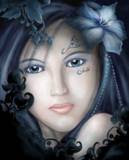Djenar confronts societal taboos, critics in first novel 'Nayla'
cited from The Jakarta Post, Sunday, July 10, 2005
A. Junaidi, The Jakarta Post, Jakarta
Nayla
Djenar Maesa Ayu
Gramedia Pustaka Utama, May 2005
180 pp
in Bahasa Indonesia
Djenar Maesa Ayu's first novel is a testament to her unchanging courage in defending women's sexuality and rejecting taboos. Through Nayla, she also rejects the criticism of certain reviewers that her writing is "titillating".
Yes, she uses words like vagina -- at least 15 times -- and penis in her novel, as she does in her short stories). But who classified these terms as "dirty"?
Djenar said she tried to be honest with herself and write about a reality she really knows and feels about (p. 121). The 32-year-old writer thus talked about women's orgasm and the issue of sexual harassment without any intention to arouse desire.
Nayla should probably be viewed from a different perspective.
For a long time, woman has been categorized (by men) as a soft and lovely creature, and a description of what makes a "good" and "bad" woman has been established over the years in many novels. In many cultures, women are often forbidden from speaking "dirty words" -- which restriction typically does not apply to men -- so that, women writers in these cultures who explore sensitive issues such as sexuality are often considered to be less intellectual and unwomanly.
For years, leading feminist literary critics, such as Helene Cixous, Julia Kristeva and Luce Irigaray, encouraged women writers worldwide to reject the taboos and bans set for women.
These feminist thinkers repudiated categorizations based on a binary opposition -- yin and yang -- which, in the end, marginalized women's works. According to this polar classification, the soul is valuable and the body less so; white is separated from black; as are men and women.
Women are often viewed through her body first and then performance, and men vice-versa.
Some local critics even included Djenar among female writers arbitrarily grouped together in the so-called Sastra Wangi, or fragrant literature, which implied that their work lacked substance. She, of course, renounced the patronizing industry categorization.
The idea of binary opposition also does not admit to other sexual orientations, such as lesbian, gay and bisexual, that have "come out of the closet" in the modern day and age.
In Nayla, Djenar continues her exploration of identity through sexuality, and goes beyond the "vagina" to a consenting, positive lesbian relationship.
The title character is an abused teenage girl. In a departure from the common theme of parental abuse by a father or father figure, Nayla's abuse is committed by her mother, who punctures her genitalia with a pin as punishment for wetting the bed. In addition, Nayla is raped by one of her mother's boyfriends in a blatant example of the failure of maternal protection.
Nayla finds happiness when she leaves home and moves in with her father, a well-known writer. But the joy does not last long, and the theme of abuse by a mother figure is extended through Nayla's stepmother.
Nayla's journey of self-discovery is facilitated through Juli, a lesbian she meets on the streets, and through an exploration of her sexual orientation, including bisexuality. As she matures and eventually becomes a writer herself, she decides she is of no singular "orientation", but a lover of humanity.
Meanwhile, Djenar also questions the age-old theory that happiness and self-satisfaction are to be found in a single partner or a single love relationship as she follows Nayla's entry and acceptance into the literary circle.
For first-time readers of Djenar's work, it may not be easy to track the flow of the story. Like her short stories, the plot jumps forwards and backwards throughout the book, with intermittent flashbacks. Others may find Djenar's characteristic style of repeating sentences and paragraphs to stress her intentions to be tiring or disruptive.
Even so, Nayla is a valuable work for both men and women to understand the pluralism of women and to look at women, femininity, perhaps even humanity, as viewed through the eyes of a woman and a woman writer -- better yet, just call Djenar a writer of contemporary humanity.
Her critics say the popularity of Djenar's work is due to her use of profanity and themes of sexual exploration -- both "unwomanly" traits -- and because there is a market for arousal. Most likely, they would say the same for Nayla.
But such criticism will fall on deaf ears.
A literary force in her own right, the mother of two has published two short story anthologies, Mereka Bilang Saya Monyet (They say I'm a monkey) and Jangan Main-Main (dengan kelaminmu) [Don't play (with your genitals)], while Waktu Nayla (Nayla's time) and Menyusu Ayah (Suckling father) received best short story awards by the largest national newspaper Kompas and feminist publication Jurnal Perempuan (Women's Journal).
Her books have gone through several reprints and have been nominated for the best book category by the prestigious Khatulistiwa Literary Award.
As Djenar once said in an earlier interview with The Jakarta Post and which she reiterates in Nayla: "I just want to write what I want to write and what I know about. I want to be honest... I don't care what people might think about me."
From such a woman, Nayla is no surprise, as the novel is ultimately about finding -- and accepting -- one's identity, no matter how it is viewed from the outside.





0 comments:
Post a Comment